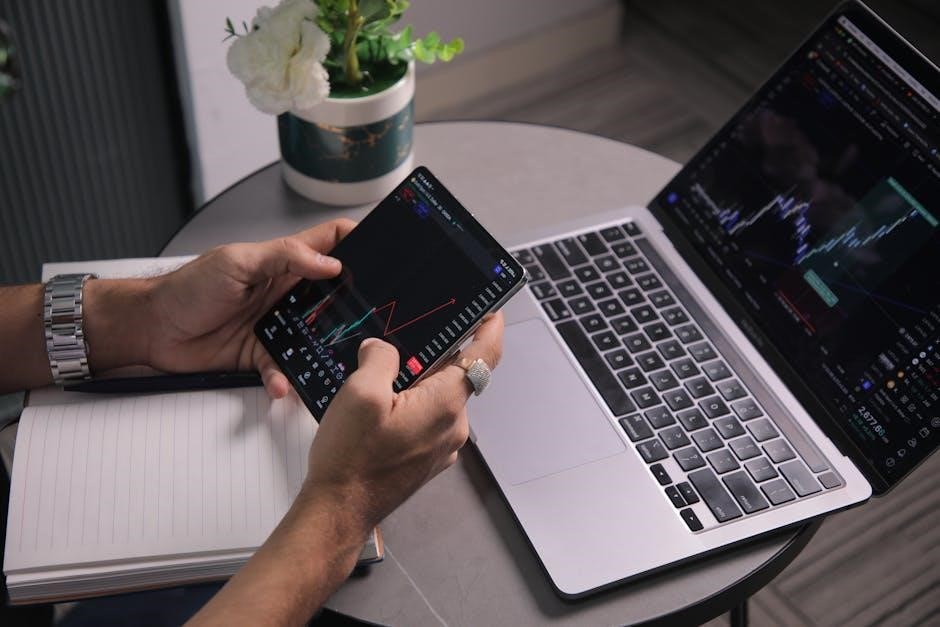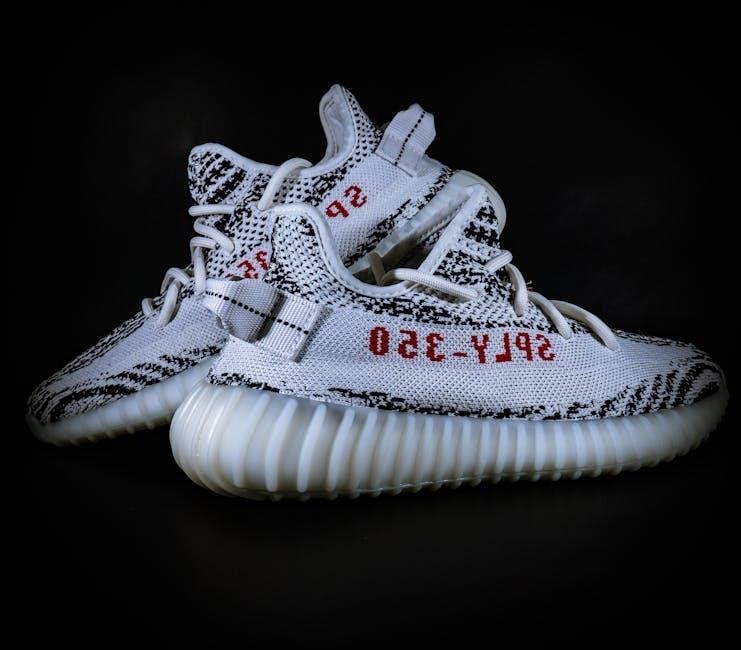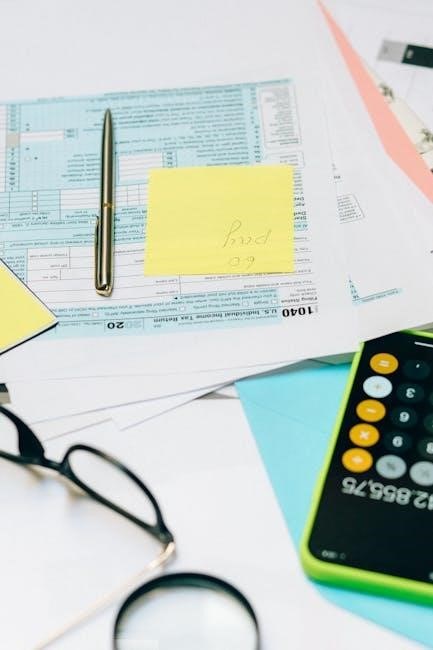sole trader expenses list pdf

sole trader expenses list pdf
A sole trader can claim allowable business expenses to reduce taxable income․ Tracking these expenses is crucial for accurate tax returns and maximizing deductions․ Proper record-keeping ensures compliance with tax laws and helps avoid penalties․ Understanding what qualifies as a business expense is essential for sole traders to optimize their financial management effectively․
1․1 Definition of a Sole Trader
A sole trader is an individual who operates a business as an unincorporated entity‚ retaining full control and ownership․ It is the simplest business structure‚ requiring minimal legal formalities․ Profits are taxed as personal income‚ and the sole trader has unlimited liability‚ meaning personal assets may be at risk․ This structure is ideal for small businesses or self-employed individuals․ Understanding the definition is crucial for complying with tax obligations and accurately reporting income and expenses․ Sole traders must maintain clear records to distinguish personal and business transactions effectively․
1․2 Importance of Tracking Expenses for Tax Purposes
Tracking expenses is vital for sole traders to ensure accurate tax returns and maximize allowable deductions․ It helps in distinguishing between personal and business spending‚ preventing overpayment of taxes․ Proper expense tracking also supports financial planning and provides a clear overview of business profitability․ Additionally‚ it ensures compliance with tax authorities‚ reducing the risk of penalties․ Maintaining detailed records is essential for verifying claims during audits․ By organizing expenses effectively‚ sole traders can optimize their tax position and make informed business decisions․ This practice is fundamental for maintaining transparency and accountability in business operations․

Allowable Business Expenses for Sole Traders
Sole traders can claim various business expenses to reduce taxable income‚ such as office supplies‚ travel costs‚ and home office expenses․ These deductions must be solely for business purposes․
2․1 Office Supplies and Equipment
Office supplies and equipment are essential for running a business and are fully deductible as allowable expenses․ This includes items like stationery‚ printers‚ computers‚ and desks․ Equipment purchased for business use‚ such as machinery or tools‚ can also be claimed․ However‚ items used partially for personal purposes must be apportioned‚ with only the business portion eligible for deduction․ Keeping receipts and records is crucial to support these claims during tax filings․ Ensuring that expenses are solely for business purposes is key to compliance with tax regulations and maximizing deductions effectively․
2․2 Travel and Transportation Costs
Travel and transportation expenses incurred for business purposes are fully deductible․ This includes mileage for business trips‚ public transport costs‚ and meals during travel․ However‚ personal use of vehicles must be apportioned‚ with only the business portion claimed․ Receipts for fuel‚ tolls‚ and parking should be retained․ For vehicles‚ the mileage allowance or actual costs can be claimed․ Ensuring accurate records of travel dates‚ destinations‚ and purposes is essential to support these deductions․ Proper documentation helps avoid disputes and ensures compliance with tax regulations‚ maximizing allowable business expense claims effectively․
2․3 Home Office Expenses
Home office expenses are deductible if the space is used regularly for business․ This includes a proportion of utility bills‚ rent‚ and internet costs․ Expenses like office furniture‚ stationery‚ and equipment are also claimable․ However‚ personal use must be excluded‚ and only the business portion can be deducted․ Accurate records‚ such as utility bills and invoices‚ are essential to support these claims․ Proper apportionment and documentation ensure compliance with tax regulations‚ allowing sole traders to maximize their home office expense deductions effectively while avoiding potential disputes with tax authorities․
2․4 Professional Fees and Insurance
Professional fees‚ such as accountants and solicitors‚ are deductible if they relate to running the business․ Insurance premiums‚ including public liability‚ professional indemnity‚ and business equipment coverage‚ are also claimable․ These expenses must be solely for business purposes to qualify․ Sole traders should retain receipts and policies as evidence․ Accurate records ensure claims are valid and compliant with tax regulations․ These deductions help reduce taxable income‚ supporting financial stability for the business․ Proper documentation is key to avoiding disputes and ensuring all eligible expenses are claimed effectively․
2․5 Marketing and Advertising
Expenses related to promoting the business‚ such as website design‚ social media ads‚ and print materials‚ are deductible․ Costs for business listings‚ online directories‚ and email marketing campaigns also qualify․ Sole traders can claim fees for graphic design and content creation aimed at attracting customers․ However‚ advertising for personal purposes or unrelated services is not eligible․ Keeping detailed records of these expenses ensures proper documentation for tax claims․ Effective marketing is crucial for growth‚ and deducting these costs helps reduce taxable income‚ benefiting the business financially․ Accurate tracking is essential for compliance and maximizing deductions․

Tax Obligations for Sole Traders
Sole traders must report all business income and claim allowable expenses on their tax return․ They use Schedule C to calculate profits and determine tax liability accurately․
3․1 Reporting Income and Claiming Expenses
Sole traders must accurately report all business income and claim allowable expenses on their tax return․ Using Schedule C‚ they calculate net profit by subtracting expenses from income․ It’s essential to maintain receipts and invoices for all expenses‚ as these documents support claims during audits․ Accurate reporting ensures compliance with tax laws and avoids penalties․ Claiming legitimate expenses reduces taxable income‚ lowering overall tax liability․ Proper record-keeping and understanding of allowable expenses are critical for sole traders to meet their tax obligations effectively and maximize deductions․
3․2 Tax Forms and Deadlines
Sole traders must file their taxes using Form 1040 and complete Schedule C to report business income and expenses․ The deadline for filing is typically April 15th‚ with extensions available under certain conditions․ Additional forms‚ such as Form 1099-K for payment card transactions‚ may be required depending on the business type․ Missing deadlines or failing to submit necessary forms can result in penalties and fines․ Staying informed about tax deadlines and requirements ensures compliance and avoids legal issues․ Proper planning and organization are essential for meeting these obligations efficiently․

Record Keeping Best Practices
Maintaining accurate and organized records is essential for sole traders․ Keep receipts‚ invoices‚ and bank statements to support expense claims․ Use digital tools for efficient tracking and organization․
4․1 Maintaining Receipts and Invoices
For sole traders‚ keeping receipts and invoices is crucial for verifying business expenses․ Organize them in a designated file or folder‚ both physically and digitally․ Ensure dates‚ amounts‚ and descriptions are clear․ This documentation supports tax claims and audits․ Regularly review and update records to avoid missing deductions․ Consider scanning receipts to prevent loss or damage․ Accurate and accessible records help streamline tax preparation and ensure compliance with tax authorities․
4․2 Digital Tools for Expense Tracking
Digital tools simplify expense tracking for sole traders‚ enhancing accuracy and efficiency․ Software like QuickBooks‚ Expensify‚ and Xero allow real-time expense logging‚ receipt scanning‚ and automated categorization․ These tools generate comprehensive reports‚ making tax preparation easier․ Cloud-based solutions ensure accessibility from any device‚ reducing the risk of lost receipts․ Integrating these tools with tax software streamlines deductions and compliance․ Regular use of digital tools helps maintain organized records‚ saving time and minimizing errors during tax filing․ They are essential for modern sole traders aiming to optimize financial management and maximize tax savings․
Common Mistakes to Avoid
Common mistakes include mixing personal and business expenses‚ leading to inaccurate tax claims․ Inadequate record-keeping can result in missed deductions or penalties․ Stay organized to ensure compliance and avoid costly errors․
5․1 Mixing Personal and Business Expenses
Mixing personal and business expenses is a common mistake that can lead to inaccurate tax claims․ Sole traders must clearly distinguish between the two to ensure compliance with tax laws․ Personal expenses‚ such as household bills or family vacations‚ cannot be claimed as business deductions․ Failing to separate these can result in overclaimed deductions‚ leading to penalties or audits․ To avoid this‚ maintain separate bank accounts and credit cards for business and personal use․ Additionally‚ regularly review expense records to ensure accuracy and validity․ This separation is crucial for maintaining proper financial records and avoiding legal complications․
5․2 Inadequate Record Keeping
Inadequate record keeping is a significant oversight for sole traders‚ often leading to missed deductions and potential tax penalties․ Failing to maintain detailed and organized records of income and expenses can make it difficult to accurately complete tax returns․ Lost or misplaced receipts‚ invoices‚ and bank statements can result in incomplete claims․ Digital tools and cloud-based solutions can help streamline record-keeping processes‚ ensuring all documents are securely stored and easily accessible․ Regularly updating financial records is essential to avoid last-minute rushes and errors during tax season․ Proper organization saves time and ensures compliance with tax authorities’ requirements․

Maximizing Tax Deductions
Maximizing tax deductions requires understanding allowable expenses and ensuring all eligible costs are claimed․ Accurate record-keeping and leveraging digital tools help identify and document qualifying expenses efficiently․
6․1 Understanding Qualifying Expenses
Qualifying expenses for sole traders are costs incurred wholly and exclusively for business purposes․ These include office supplies‚ travel expenses‚ professional fees‚ and marketing․ Personal expenses are ineligible․ HMRC guidelines specify that expenses must be reasonable and directly related to business operations․ Understanding these criteria ensures accurate claims‚ optimizing tax deductions․ Proper documentation and categorization of expenses are essential to avoid disputes and ensure compliance with tax regulations․ This knowledge helps sole traders maximize deductions while adhering to legal requirements‚ ensuring financial efficiency and minimizing tax liabilities effectively․ Proper planning and review of expenses are recommended for optimal outcomes․
6․2 Ensuring All Deductions Are Claimed
To maximize tax savings‚ sole traders must ensure all eligible expenses are claimed․ This requires meticulous tracking of business-related costs throughout the year․ Utilizing digital tools or spreadsheets can help organize expenses‚ ensuring none are overlooked․ Regularly reviewing financial records and consulting tax professionals can also identify potential deductions․ Accurate and detailed documentation is essential for supporting claims during tax filings․ By thoroughly assessing all eligible expenses‚ sole traders can minimize tax liabilities and retain more business profits‚ ultimately improving financial stability and growth․

Case Study: Effective Expense Management
A small business owner implemented a digital tracking system‚ ensuring all expenses were recorded and categorized accurately‚ leading to significant tax savings and improved financial clarity․
7․1 Practical Example of Expense Tracking
A freelance graphic designer used a digital app to log expenses like software‚ travel‚ and office supplies․ By categorizing each expense‚ they ensured accurate tax deductions․ Regular reviews helped identify trends‚ such as high software costs‚ leading to budget adjustments․ This organized approach allowed them to claim all eligible expenses‚ reducing taxable income and optimizing financial performance․ The clear records also simplified tax filing‚ demonstrating the value of consistent tracking for sole traders seeking to maximize deductions and maintain compliance with tax requirements․ This method ensures transparency and efficiency in managing business finances effectively․

Additional Resources
Download a comprehensive PDF guide for sole traders‚ explore interactive tax calculators‚ and access video tutorials to streamline expense tracking and maximize deductions effectively․
8․1 Downloadable PDF Checklist
A downloadable PDF checklist is a valuable tool for sole traders to organize and track expenses efficiently; It provides a structured format to list income‚ categorize expenses‚ and ensure no deductions are missed․ The checklist often includes sections for office supplies‚ travel costs‚ home office expenses‚ and professional fees․ By using this resource‚ sole traders can maintain accurate records‚ simplify tax preparation‚ and ensure compliance with tax requirements․ Regular updates keep the checklist relevant‚ reflecting changes in tax laws and expense categories․
8․2 Links to Tax Guides and Software
Accessing reliable tax guides and software is essential for sole traders to manage expenses effectively․ The IRS provides detailed resources on allowable deductions‚ while HMRC offers specific guidance for UK-based sole traders․ Tools like TurboTax and QuickBooks simplify expense tracking and tax filing․ Additionally‚ platforms such as Crunch offer comprehensive guides tailored for sole traders․ These resources ensure accurate reporting‚ compliance with tax laws‚ and maximizing deductions․ Utilizing these tools helps streamline financial management and reduces the complexity of tax preparation for sole traders․